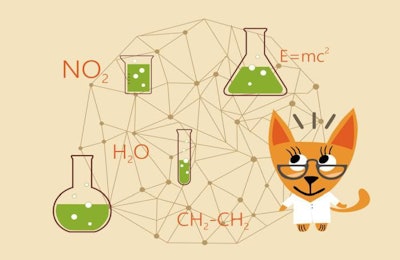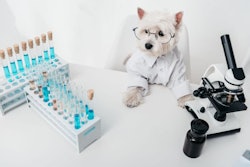
Taurine from lab-grown meat may allow pet food formulators to make vegan and vegetarian dog and cat foods, while avoiding dilated cardiomyopathy and adhering to the clean label trend.
Taurine, essential for cat health and popular in human energy drinks, occurs naturally in animals’ bodies, which makes that source of the chemical unacceptable for vegans and vegetarians. However, most taurine supplemented into pet food comes from industrial laboratories, knocking it out of the running as a clean label pet food ingredient.
“Ironically, the main essential nutrient that is cited as being the limiting factor in creating animal-free cat food is already included in commercial pet food from a vegan, synthetic source,” Shannon Falconer, PhD, CEO of Because Animals, told Petfood Industry in an email.
Falconer and her team work to create cell-cultured mouse muscle tissue for pet food. That manufactured meat could solve the problem of taurine supplementation in pet food that is both vegan or vegetarian and clean label.
“The presence of taurine and/or L-carnitine in cultured meat has not yet been empirically shown,” Falconer said. “However, the potential to isolate both of these molecules from cultured meat is absolutely possible, and will depend on how the tissue is cultured. Because Animals is currently working on this.”
Cell-cultured meat as taurine source for cat and dog food
Cats need taurine in their diets for healthy functioning of various organs, including the heart. To prevent dilated cardiomyopathy (DCM), conventional cats foods include taurine supplements, along with taurine from meat sources. Some scientists recommend that grain-free dog food formulators also add taurine to avoid DCM concerns.
Considering the medical importance of taurine to pets, cell-cultured muscle tissue will need to match conventional sources in terms of quality. Similarly, the cost of lab-grown meat taurine must be financially feasible for manufacturers and pet owners.
“A very common misconception about commercial cat food is that the meat contained in the food is the main source of taurine,” said Falconer. “This is not the case. Taurine is a very water soluble compound, and it is generally lost (if not significantly depleted) during the extrusion and manufacturing process. This is why "taurine" is listed as an ingredient on virtually every nutritionally-complete commercial cat food product - it must be added back to the food in supplemental form after being lost during processing. And the source of the supplemental taurine is synthetic, not animal-derived…
“The source of taurine contained in Because Animals' future nutritionally-complete cat foods will be the same quality and cost as the synthetic vegan taurine already found in current commercial foods.
Animal welfare concerns and taurine in pet food
Although organic chemistry supplies much of the taurine in pet foods, cell-cultured meat could provide taurine from biological sources for those who demand pet food that contains no artificial ingredients, nor animal products.
Many of the pet owners who contact Falconer don’t necesarily identify themselves as vegan or vegetarian, she said. However, when pet owners volunteer to be first in line to buy lab-grown mouse meat pet food, their comments suggest people acknowledge the environmental effects of the pet food industry and want to avoid contributing to ecological problems. Likewise, these pet owners demand human treatment of livestock and wildlife, just as they mind the well-being of their pets.

















